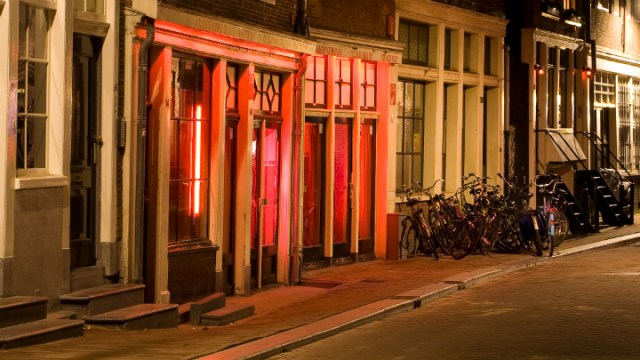The Roots, and DANGERS, of Pig-headed Closed-Minded Ideological Thinking

Last week when the Egyptians voted in an open election for the first time in decades, having won the right to this inspirational exercise of democracy by standing up to and overthrowing their repressive government (sound familiar, America?), the result was met by some in the U.S. with disdain. Why? Because some didn’t like the results. The parties that won the most seats were too Islamic.
The Muslim Brotherhood did best, prompting one of my more conservative friends to comment derisively; “Ah, the “Arab spring” begins paying dividends.” My friend’s Facebook comment came with a link to a news story about the election from Arutz Sheva, an Israeli news source identified with religious Zionism and the Israeli right wing settler’s movement…a source with an easy-to-recognize bias. My conservative friend also directed me to an essay in The National Review (hardly known as a font of unbiased thinking), “Fear the Muslim Brotherhood”. It had been written in response to a piece in the Daily Beast titled “Don’t Fear the Muslim Brotherhood” . The National Review article took the “Don’t Fear…” piece to task, in part because it was written by a “Brookings scholar and Obama administration national-security adviser,” and which follows “…the template the progressive (and bipartisan) foreign-policy establishment has been sculpting for years.” In other words…”here’s a rebuttal to the progressive/bipartisan view…a perspective on the issue through a conservative lens.”
I know too little about Egyptian politics, or the Muslim Brotherhood in particular. I am certainly not well-informed enough to intelligently judge whether there is any reason to fear these results. Neither, almost certainly, is my friend. But this essay isn’t about the Egyptian election. It’s about where our opinions come from. This little episode so clearly demonstrates how the positions we take on so many of the issues of the day are based less on the facts themselves, and far more on the powerful imperative that drives us all to interpret the facts so our views match those in the groups with whom we most strongly identify, the phenomenon called Cultural Cognition. With climate change or abortion or government spending or gun control or any issue, we cherry pick the evidence for the parts that reinforce OUR view. We twist and bend and play up or down the facts so they serve OUR argument. We defer to and adopt the beliefs and opinions of the leaders of OUR tribe.
This is not open minded, fair, careful thinking. It’s not thinking to get at what may actually be the truth. It’s the abandonment of independent thought, a ‘ditto-head’ deference to the tribal view in the name of the reassuring safety of social cohesion. We are social animals who depend on the tribe for our survival, so the tighter the tribe, and the more the tribe accepts us as a member in good standing, the safer we are. As important as survival is, we are all prone to think like this, and the more threatened we are, the more we seem to do it….the more closed and polarized and angry at ‘others’ our thinking becomes.
I thought I’d challenge myself, since my thinking is narrowed by this same effect, and actually go to someone whose views about Egyptian politics aren’t distorted by the right-left prism of U.S. politics. I asked a friend in Egypt, a journalist who spent weeks protesting in Tahrir Square, to educate me about the Muslim Brotherhood. With her permission I share her comments here, both to add her insights to your knowledge about this issue, but even more, to demonstrate SO clearly how distorted by Cultural Cognition my Facebook friend’s thinking sounds by comparison.
– – – – –
That isn’t an easy question to answer. I know the MB quite well. I was close to them in my university years. Many of my friends are or were MB members. Actually, many of my friends WERE MB members. The MB has lost a significant number of members in the past decade because they were seen to be archaic in the way they ran the organization internally. Although they do involve women in their work, it’s only up to a point and sometimes it seems they involve women as much as it gives them a good image (my opinion). Younger members (meaning anyone under 40) have long complained that the older members make the decisions and do not involve everyone else in the decision-making process. And members who have left have felt that they are incapable of keeping up with the changing times; they need to become more modern in their approach.
Having said all that, they have been involved in Egyptian politics for decades. Their members have been in parliament – although never a majority. They also have an excellent track record in running the doctors’ and engineers’ syndicates in addition to their social work within the country. Thus they have a lot of experience and they also have a lot of support from what is a majority somewhat conservative Muslim country.
If you were to take all the Islamic groups on the scene today and rate them on how liberal (1) or extreme (10) they were, I can’t think of a more liberal Islamic group than them. I’m quite worried about the fact that the Salafis seem to have gotten many seats in this past election. The Salafis have absolutely no experience in Egyptian politics. It was their policy not to be involved. And they are much more conservative than the MBs and they follow a literal interpretation of the religious texts, which means that they can be very inflexible. The MBs are much more flexible and there is room for them to progress and change even though it’s taking them too long to do so.
They are not the type of group that would force women to wear the head scarf or force people to practice a certain form of Islam. My expectation is that they will focus on building the country rather than on building a religious society. We all expected that the MB would take a majority in parliament if Mubarak was removed. They are the only organized group in Egypt that has any political experience and trust among a large portion of the population. Having them in parliament isn’t the worst thing that can happen to our country. But I think many of us were hoping to see more diversity in parliament and more representation of other sectors of society. Many of us want to see Egypt moving into the 21st Century. We might be kept back in some ways if an Islamic group like the MB are a majority. Or maybe not. I’m not clear who is going to put together the government after the elections. The indications are that it won’t be the winning party as is customary in many countries around the world. It’s the government and who is running it that are really important. Parliament passes (or doesn’t) laws and supervises government. So maybe a MB majority won’t have as much clout in the country as we’re worrying about.
Short story: in my opinion it’s not a disaster. I would have liked to see a wider representation of society. I’d like to see Egypt becoming more liberal. The liberals and secularists in Egypt are not strong. They are not united. They have very small followings. And very little experience on the ground with charitable services and politics. It’s going to take time for political parties to grow and have an impact so that they do get followings. We just need to give it some time.
– – – – –
This one informed person’s perspective is not the whole answer about the Muslim Brotherhood either. It is not offered here as such. However, in contract to the perspective of my National Review-reading friend, her thoughts do demonstrate how ideology taints and narrows our thinking, how it sacrifices open-mindedness and careful fair deliberation for what feels tribally reinforcing and safe. Safe is good, of course. But polarized and narrow-minded and angry at/threatened by anyone who disagrees with you, is not. It impedes progress. It blocks compromise. It even just keeps us from being able to listen to each other, and learn. And that’s not safe. It’s dangerous.




